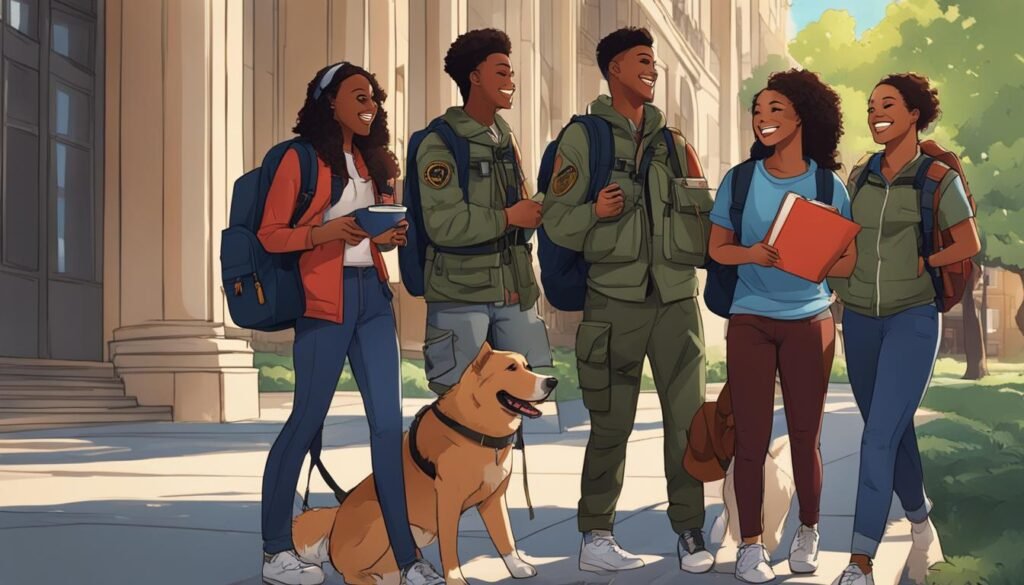Joining the armed services provides a unique educational opportunity, but transitioning from the military to college life can be challenging. Veterans have advantages such as discipline and valuing education, but they may also face difficulties adjusting to the freedom of a college campus. Understanding the advantages and disadvantages of being a veteran student can help ease the transition process. Resources like veterans services and organizations such as Student Veterans of America and the American Council on Education can provide valuable support.
Key Takeaways:
- Veterans face unique challenges when transitioning from the military to college life.
- Resources like veterans services and organizations can offer valuable support during this transition.
- Understanding the advantages and disadvantages of being a veteran student is important for a successful adjustment.
- Veterans have access to various resources, including healthcare, financial aid, and academic credit for their military service.
- Effective time management, seeking academic support, and connecting with other veteran students can enhance academic adjustment.
Advantages and Challenges Veteran Students Face in College

Veteran students bring unique qualities and experiences that can contribute to their success in college. Their life experience, self-motivation, discipline, focus, and leadership skills often result in higher GPAs and graduation rates compared to traditional college students. Additionally, the financial resources available through the GI Bill provide them with the means to pursue their academic goals.
However, veteran students may also encounter challenges during their college journey. Many of them are first-generation students, lacking the familial support and knowledge of navigating the college system. Balancing family responsibilities, managing finances, and dealing with physical, learning, and emotional challenges resulting from injuries or post-traumatic stress can further complicate their college experience.
It is crucial for veteran students to be aware of both the advantages and challenges they may face. By acknowledging these factors, they can seek the necessary support and resources to ensure a successful transition to college life.
The Advantages of Veteran Students
| Advantages | Description |
|---|---|
| Life Experience | Veterans bring a wealth of knowledge and wisdom gained from their military service, enhancing their perspective and understanding of the world. |
| Self-Motivation and Discipline | The military instills discipline and a strong work ethic in veterans, which translates into their academic pursuits. |
| Focus and Leadership Skills | Veterans possess the ability to stay focused on their goals and often excel in leadership roles, both inside and outside the classroom. |
| Financial Resources | The GI Bill provides financial support for education, relieving veterans of some financial burdens and allowing them to focus on their studies. |
The Challenges Faced by Veteran Students
- First-Generation College Students: Many veteran students may be the first in their families to pursue a college degree, lacking the guidance and support that comes with having family members who have gone through the college experience.
- Family Responsibilities: Balancing the demands of family life, such as caring for children or elderly relatives, while attending college can be overwhelming for veteran students.
- Financial Management: Some veteran students may struggle with managing their finances, especially if they are adjusting to civilian life and the transition from military pay to other sources of income.
- Physical, Learning, and Emotional Challenges: Injuries or post-traumatic stress can present significant challenges for veteran students, affecting their physical and mental well-being as well as their academic performance.
“Veteran students bring a unique perspective and valuable skills to the college campus. However, it’s important to acknowledge the challenges they may face and provide the necessary support to ensure their success.” – John Smith, Director of Veterans Services
Resources for Veterans’ College Adjustment
Veteran students have access to various resources to ease their college adjustment. Most colleges have veterans support offices that can help navigate financial benefits, connect with healthcare services, and provide other resources. Organizations like Student Veterans of America offer support and have chapters at many colleges nationwide. The American Council on Education can help veterans receive academic credit for their military service. The Veterans Integration to Academic Leadership program by the Department of Veterans Affairs supports veterans’ physical and mental health during the transition to campus life.
| Resource | Description |
|---|---|
| Veterans Support Offices | These offices provide assistance with financial benefits, healthcare services, and other resources to help veteran students navigate college life. |
| Student Veterans of America | This organization offers support and has chapters at many colleges nationwide. They provide resources, networking opportunities, and events specifically tailored to veteran students. |
| American Council on Education | The American Council on Education helps veterans receive academic credit for their military service, giving them a head start in their college education. |
| Veterans Integration to Academic Leadership | This program by the Department of Veterans Affairs focuses on supporting veterans’ physical and mental health during their transition to campus life. It provides resources, counseling services, and support groups. |
By utilizing these resources, veteran students can find the support they need to navigate the challenges of college life. Whether it’s accessing financial aid, connecting with healthcare services, or receiving academic credit for their military experience, these resources are designed to help veteran students succeed in their academic pursuits. It is important for veteran students to take advantage of these resources and seek support when needed to ensure a smooth and successful college adjustment.
Academic Adjustment for Veteran Students

Veteran students may face unique challenges when adjusting to college academics. The transition from a structured military environment to the freedom of college can be overwhelming. Additionally, veteran students may have limited academic preparation compared to traditional students, which can make the demands of higher education more difficult to manage. However, with proper support and strategies, veteran students can successfully navigate the academic adjustment process.
Time management is crucial for veteran students to effectively balance their coursework with other responsibilities. Developing a schedule and prioritizing tasks can help ensure that academic requirements are met without neglecting other commitments. It may also be beneficial for veteran students to utilize resources such as academic advisors and tutors to enhance their learning experience and address any gaps in knowledge or skills.
Furthermore, veteran students should take advantage of any academic credit options available for their military service. Many colleges offer credit for military training and experience, which can shorten the time needed to complete a degree. By leveraging these opportunities, veteran students can streamline their academic journey and focus on their areas of interest and career goals.
Benefits of Academic Support Services
Colleges often provide a range of academic support services that can be especially beneficial for veteran students. These services may include study skills workshops, writing centers, and peer tutoring programs. Engaging with these resources can help veteran students improve their study habits, enhance their writing skills, and clarify complex course materials. Taking advantage of these services can alleviate academic stress and promote success in college academics.
Joining study groups or forming study partnerships with fellow students can also be advantageous for veteran students. Collaborating with peers allows for the exchange of ideas, fosters a sense of community, and provides an opportunity to learn from others’ perspectives. These interactions can enhance understanding of course content, boost motivation, and build valuable relationships with classmates.
Table: Time Management Tips for Veteran Students
| Tip | Description |
|---|---|
| Create a schedule | Plan your study time and other commitments in advance to ensure you allocate enough time for each task. |
| Set goals | Break down your academic tasks into smaller, manageable goals to stay focused and motivated. |
| Prioritize tasks | Identify the most important tasks and complete them first to avoid feeling overwhelmed. |
| Avoid procrastination | Start your assignments and studying early to avoid last-minute pressure and improve the quality of your work. |
| Utilize technology | Use productivity apps or online tools that can help you stay organized, manage your time effectively, and set reminders for deadlines. |
By implementing effective time management strategies and utilizing academic support services, veteran students can overcome the challenges of adjusting to college academics. With dedication, perseverance, and the right resources, they can thrive in their academic pursuits and achieve their educational goals.
Social Integration Tips for Veterans in College
Adjusting to college life can be challenging for veteran students, especially when it comes to social integration. As a veteran student, you may find yourself facing unique social challenges, such as age differences, coming from a different background, and having different life experiences than your peers. However, there are several strategies you can employ to enhance your social integration and create a sense of belonging on campus.
Join Student Organizations
One of the most effective ways to connect with peers and establish relationships is by joining student organizations. These groups provide a platform for like-minded individuals to come together and engage in shared interests and activities. Look for student organizations that align with your passions, hobbies, or areas of study. By actively participating in these groups, you’ll not only expand your social network but also gain valuable skills and experiences.
Attend Campus Events
Another great way to connect with your peers and immerse yourself in campus life is by attending campus events. Keep an eye out for social, cultural, or academic events happening on campus and make an effort to attend. These gatherings provide opportunities to meet new people, learn about different cultures and perspectives, and engage in meaningful conversations. Remember, stepping out of your comfort zone and embracing new experiences can lead to rewarding social connections.
Reach Out to Other Veteran Students
Connecting with other veteran students can provide a sense of camaraderie and support. Seek out veteran student organizations or clubs on campus, such as Student Veterans of America chapters, and reach out to fellow veterans. These individuals may have similar experiences and understand the challenges you face. By sharing your stories, supporting each other, and collaborating on common goals, you can build a strong support network that enhances your social integration and overall college experience.
| Benefits of Social Integration | Challenges of Social Integration |
|---|---|
|
|
Mental Health Resources for Veterans in College
Veteran students in college often face unique mental health challenges, particularly those related to their military service. Conditions such as post-traumatic stress disorder (PTSD) and anxiety can impact their overall well-being and academic success. It is crucial for veteran students to prioritize their mental health and seek support when needed.
Fortunately, there are various mental health resources available to veteran students in college. Campus counseling services offer confidential support and therapy sessions to help students navigate their mental health concerns. These services often have counselors who specialize in working with veterans and understand the unique challenges they may face.
Additionally, organizations like Student Veterans of America provide access to mental health resources and support groups specifically tailored to the needs of veteran students. These resources offer a sense of community and understanding, allowing veterans to connect with peers who have similar experiences and challenges.
It’s essential for veteran students to be aware of these resources and take advantage of them. Seeking help and support is not a sign of weakness but a proactive step towards maintaining a healthy mental state. By prioritizing their well-being, veteran students can effectively manage the demands of college life and achieve their academic goals.
Mental Health Resources for Veteran Students
| Name | Description | Contact |
|---|---|---|
| Campus Counseling Services | Confidential counseling services provided by the college to address mental health concerns. | Contact your college’s counseling center for more information. |
| Student Veterans of America | Organization offering mental health resources and support groups tailored to veteran students’ needs. | Visit the Student Veterans of America website for more information. |
Balancing Family, Work, and College for Veterans
Being a veteran student comes with unique challenges, especially when it comes to balancing family, work, and college. Many veterans have additional responsibilities, such as taking care of their families or working part-time or full-time jobs, while pursuing their college education. Balancing these responsibilities can be demanding, but with proper planning, time management, and support, it is possible to successfully manage all these roles and excel in your academic pursuits.
One important aspect of balancing family, work, and college is effective time management. Prioritize your commitments and create a schedule that allows you to allocate dedicated time for each responsibility. This may involve setting aside specific study hours, coordinating with family members for childcare or household tasks, and communicating with your employer about your availability. By organizing your time effectively, you can ensure that you meet your obligations in all areas of your life.
Additionally, seeking support from your family and employers is crucial. Open and honest communication with your loved ones about your college goals and the challenges you may face can help them understand your needs and provide the necessary support. Similarly, discussing your responsibilities and educational pursuits with your employer can lead to flexible work arrangements that accommodate your college schedule. Many employers value education and may be willing to adjust your work hours or responsibilities to help you succeed.
Remember, you are not alone in this journey. Connect with other veteran students who are facing similar challenges. Joining student organizations or veteran support groups can provide a valuable network of individuals who understand your situation and can offer advice and support. Sharing experiences and learning from others who have successfully balanced family, work, and college can provide valuable insights and strategies.
| Balancing Family, Work, and College Tips |
|---|
| 1. Prioritize your commitments and create a schedule that allows dedicated time for each responsibility. |
| 2. Communicate openly with your family and employers about your college goals and challenges. |
| 3. Seek flexible work arrangements that accommodate your college schedule. |
| 4. Connect with other veteran students through student organizations or support groups. |
Conclusion
Transitioning from the military to college life can be a challenging process, but it is important to remember that you have a strong support system and valuable resources available to help you along the way. By being aware of the advantages and challenges that veteran students may face, you can better navigate the college adjustment process and achieve your academic goals.
Remember to take advantage of the resources specifically designed for veterans, such as veterans services offices and organizations like Student Veterans of America. These resources can provide you with valuable support and guidance throughout your college journey.
Additionally, it is crucial to prioritize your mental health and well-being. Seek help when needed and utilize the mental health resources available to you, whether it be through campus counseling services or support groups offered by veteran organizations. Taking care of your mental health is essential for your overall success in college.
Lastly, don’t hesitate to reach out for assistance when balancing your responsibilities as a veteran student. Effective time management, open communication with professors, and seeking flexible work arrangements can help you successfully manage your family, work, and college commitments. Remember that you have already acquired valuable skills and experiences through your military service, which can be advantageous in your academic pursuits.
FAQ
What advantages do veteran students have in college?
Veteran students have advantages such as discipline, self-motivation, focus, leadership skills, and access to financial resources through the GI Bill. They also have higher GPAs and graduation rates compared to traditional college students.
How can Veterans Leverage Their Military Experience for Success in College?
Veterans possess a unique set of skills that can greatly benefit their college experience. From strong leadership abilities to disciplined work ethic, their military experience equips them with invaluable attributes. These qualities not only aid them in their academic pursuits but also foster personal growth, making them exceptional contributors to campus life. Ultimately, the benefits of military experience in college go beyond the classroom, creating a pathway to success for veterans.
What challenges may veteran students face in college?
Veteran students may face challenges such as being first-generation college students, balancing family responsibilities, managing finances, and dealing with physical, learning, and emotional challenges resulting from injuries or post-traumatic stress.
What resources are available to support veteran students in college?
Most colleges have veterans support offices that can help navigate financial benefits, connect with healthcare services, and provide other resources. Organizations like Student Veterans of America offer support and have chapters at many colleges nationwide. The American Council on Education can help veterans receive academic credit for their military service.
How can veteran students adjust to college academics?
Veteran students should develop effective time management and study skills, seek academic support when needed, and take advantage of any academic credit options available for their military service. It is important to recognize that they may have limited academic preparation compared to traditional students.
Veteran students can join student organizations, participate in campus events, and reach out to other veteran students to establish connections and build a support network. It is important to be proactive in seeking social opportunities and finding like-minded individuals on campus.
What mental health resources are available to veteran students in college?
Campus counseling services, veterans support offices, and organizations like Student Veterans of America can provide access to mental health resources and support groups. It is important to prioritize mental health, seek help when needed, and take advantage of the resources available.
How can veteran students balance family, work, and college responsibilities?
Veteran students can seek flexible work arrangements, utilize resources like childcare services, and communicate with professors about any conflicts. With proper planning, time management, and support from family and employers, it is possible to successfully manage all these roles.



